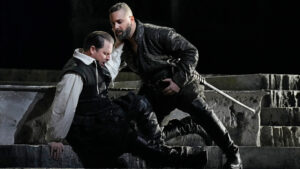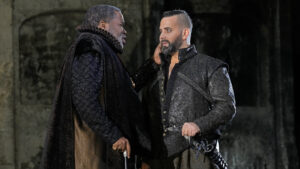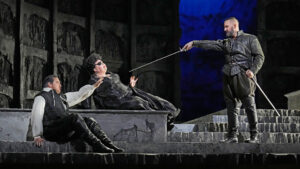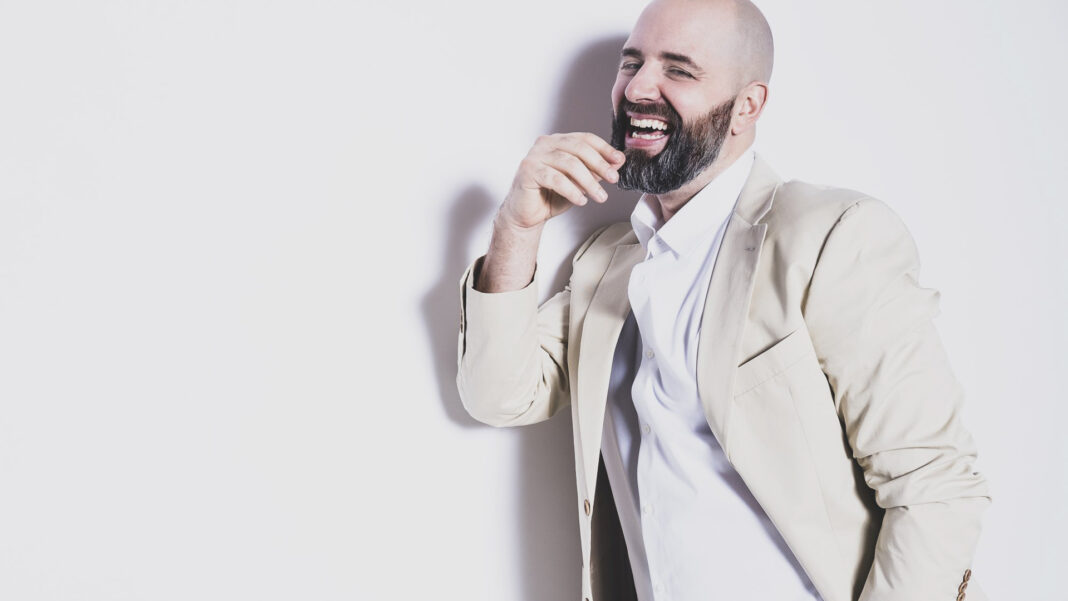We think of long plays, concerts or operas as marathons. We wonder how is it possible that the people on stage can sustain their energy for as long as they do. For the cast of the Metropolitan Opera’s Don Carlos, they not only have a long opera that runs 3-1/2 hours of pure stage time, Giuseppe Verdi’s opera is also being sung there for the first time in its original French language version. For baritone Etienne Dupuis, who plays the role of “Rodrigue,” it’s a blessing.
“I’ve always seen all those nuances and everything that’s written on the page and I’ve tried to do them as best I could. But then in French what’s amazing is that it just works,” he said during a recent Zoom call. “It makes more sense. In Italian you had to make sense of it and in French it already makes sense. It makes it easier to sing, but it also makes it easier to understand, not just for us, for the audience. Things are clearer. The text is clear. The intentions are clearer.”

Verdi’s opera tells the story of Don Carlos of Spain (Matthew Polenzani) and Élisabeth de Valois (Sonya Yoncheva) who are betrothed to one another. They have never met. Don Carlos sneaks away to meet this unknown woman. They fall in love. However, their happiness is quickly ruined when Carlo’s father, Philippe II (Eric Owens), announces that he’s in love with her and she is to be his bride.
Even though she is now his stepmother, Don Carlos tries multiple times to woo Élisabeth away from his father.
With the Spanish Inquisition ongoing, the affairs of all three and the appearance of a mysterious monk lead to murder plots, revenge, unrequited love and thievery.
Verdi’s opera debuted in 1867 in Paris in French. Three months later it was performed in London in Italian. That version is the one most commonly performed.
This Saturday’s performance is the last opportunity for audiences to see Dupuis as Don Carlos’ best friend, but it’s also the performance that is being made available around the world as part of Met Opera Live in HD series.
Don Carlos is Verdi’s longest opera, but Dupuis finds much to like in these lengthy works even though they might be a bit convoluted.
“I think that’s a little point, isn’t it? Let’s make this as long as complicated as we can,” he says rhetorically. “You have to understand it from going back in time when they were writing them. These people had nothing like we do to to change their minds and just turn on a machine in their living room. So when they finally got the time to dress up and go to the opera it was a six hour long business. Every opera needed to have a minimum of five acts and a ballet. The only problem when Verdi wrote it was that the opera was too long. The people would have to catch the last train. So you have to shorten it enough so that people had time to go and catch the last train. But he had written even longer than what we’re doing.”
Dupuis counts himself amongst those who are usually most comfortable when opera hues primarily to the way fans and audiences usually see them. But with Don Carlos he thinks there is a great argument for performing Verdi’s work in the original French language.

“We like things the way we know them,” he says. “It is assembled this way, conducted this way, stage like that. And so it’s really hard for anyone to come up with something new. What’s interesting is that in this case we’re not changing what Verdi wrote. We’re using what Verdi wrote. What the French triggers is perhaps the sense that you’re hearing it for the first time. It allows you to re-hear it for the first time to possibly re-experience that first-time experience of the initial moment you actually heard this. But I know it’s not easy for everybody to open up their mindset to that.”
To make his point he brings up an example of his first aria in the opera which he describes as being a bit on the boring side…until it is sung in French.
“My first aria can be very boring. It might still be, I don’t know, but it’s two verses of the same music. The entire goal of this aria is to convince the Queen to have a meeting with Don Carlos. That’s all I’m doing. But I never understood how every word is carefully chosen so that it would make sense for the Queen to accept this invitation. So it’s very interesting how I get to play with those words so much better in the French. Even though I do speak Italian, when I sing the Italian it’s an inversion of the lines. It’s so intricate to be fitting the music that I feel like I’m losing this sense that the whole time my character is talking on a second degree. That’s lost in the translation because they had to make every word fit the the musical line. Instead of fitting the music on the words it did the opposite and it didn’t allow them to have these layers of understanding.”
One of the best known arias in Don Carlo is Dieu, tu semas dans no ames. To be performing an opera that features an aria about devotion to liberty at a time when the world is crisis adds additional meaning to Don Carlo for Dupuis.
“Every word that I say just made more sense. It already made sense in a generic context of war. But if you think of my character as this guy who is following the army. He goes to Flanders and he sees what the king and most importantly, the church, the Inquisition, he sees what they’re doing to those people because they’re not of the same religious belief. They’re Protestants and so the only response that they have is we kill everyone that doesn’t think like of us. And boom! Immediately we’re like, wait, is that what Putin was saying? This country right next to us they don’t think like me. Therefore, I must crush them like this. It seemed to me that that’s exactly what was happening.”
A different language and a new awareness are just two factors that allow Dupuis to try to achieve perfection in this production and in his art. Verdi said, “I have striven for perfection, it has always eluded me, but I surely had an obligation to make one more try.” Dupuis completely agrees with the composer.

“I don’t think perfection is achievable, but I think it’s a great goal. I think the people that have obsessed a bit too much about it definitely either changed careers or drowned in their careers. I think one of the hardest things to do is to strive for perfection and then have the humility to recognize that you did your best.”
One of Dupuis’ best attempts at that was in Jake Heggie‘s opera Dead Man Walking in Montreal.
“It was by far the most successful show I’ve ever been in opera. Not one review, not one person had anything bad to say about it. But it wasn’t perfect and I know it wasn’t. What was great about it though is that there was emotion. People lived something. They experienced something. Did we go to the theater for a reason? Do we live something that made us interested in going back? I think that’s what we should strive for, but I don’t think perfection is attainable. And I think that’s OK.”
There is so much more to my conversation with Etienne Dupuis. To see the full interview, please go to our YouTube channel here.
Main photo: Etienne Dupuis (Photo by Dario Acosta/Courtesy of the artist)











